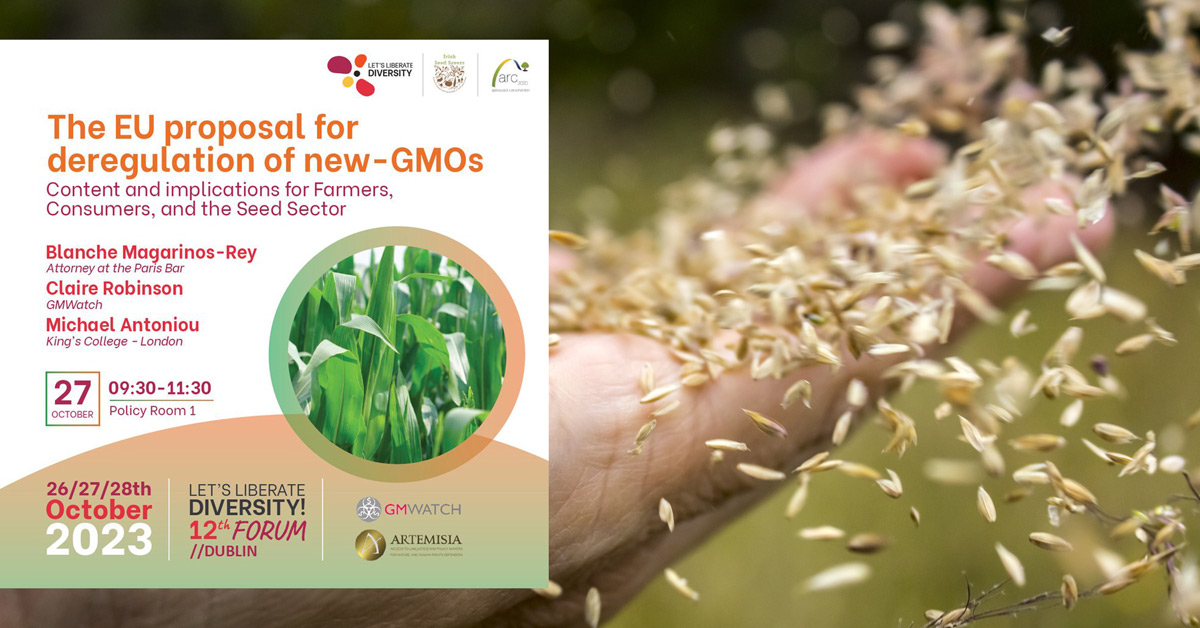
GMWatch joined a lawyer and a scientist at a seed diversity conference to discuss the Commission's attempt to "disappear" new GMOs
On 27 October, GMWatch's Claire Robinson joined lawyer Blanche Magarinos-Rey and molecular geneticist Prof Michael Antoniou in a presentation on the EU Commission proposal to remove safety checks, traceability and labelling from new GM foods, at the Let's Liberate Diversity! conference in Dublin, Ireland. The presentation explained the content of the proposal and its implications for consumers, farmers, and the seed sector, including breeders.
The organisers of the conference, Let's Liberate Diversity! in partnership with the Irish Seed Savers, have a mission to promote diversity in the seed, agriculture, and food systems and to encourage seed saving and plant variety conservation.
Introducing the session, Claire said that while the seed savers and growers participating in the conference prioritised genetic integrity and diversity, as well as broad access to seed, the GMO industry is going in the opposite direction – damaging genetic integrity and diversity by encouraging huge monocultures and reducing seed choice in the marketplace, and tying up valuable germplasm by patenting seeds.
Blanche, founder of the environmental and human rights law firm Artemisia, kicked off the presentation by explaining what the Commission proposal contained. The proposal divides new GMOs into two categories. Category 1 GMOs – which, as GMWatch reported, is expected to comprise around 94% of all new GMOs – would not be subjected to safety checks or traceability requirements; nor would they be labelled for the consumer.
Blanche said the main aim of the proposal was to abolish GMO labelling, the central factor that has led to mass consumer and retailer rejection of GMOs in the EU. The absence of labelling, along with the lack of traceability and detection methods, would mean that the effects of new GMOs on health, the environment, and farming will simply be unknowable. They will be "out there", but no one will know where.
Claire described the implications of the proposal for consumers, farmers, and breeders, pointing to the safety questions over GM foods both old and new and illustrating some of the ways that the patents that apply to all GMOs can seriously impact farmers and breeders.
As an example, some plant breeders have already privately reported receiving aggressive letters from large GMO developer companies, threatening legal action if the breeders inadvertently use their patented genetic sequences (even when those sequences are the product of conventional breeding and not GM). Increasing the number of patented GM plants on the market – a stated aim of the Commission's proposal – will increase the risk that breeders and farmers will find themselves entangled in a "patent thicket", meaning they will have to pay licence fees and/or royalties to the patent owners if they infringe a patent.
Similarly, GMO developer companies could sue farmers or extort money from them if their crop was alleged to contain patented GMOs – something that could happen via cross-pollination. If the Commission gets its way, in a break from current law, no detection method will be required to be supplied to the regulator by the GMO developer. This means the only entity that could confirm GMO contamination or the absence of it is the GMO developer. There is a precedent in Brazil for farmers being forced to pay royalties to Monsanto when the company alleged that the farmers' non-GMO soy crops had been contaminated by the company's patented genes.
Prof Antoniou then explained the scientific reasons why deregulating new GMOs is an irresponsible idea that goes against the science underpinning these products. He said that new GM techniques are not precise or predictable in their outcomes and that the risks of foods produced with these techniques include unexpected toxicity and allergenicity. For this reason, each new GMO must be subjected to a detailed risk assessment for health and the environment, as well as traceability and labelling requirements, as currently applies to all GM foods and crops in the EU.
Claire wound up the combined presentation with recommendations on what concerned citizens and groups can do to oppose the Commission's proposal. This involves writing to MEPS and demanding that safety checks, traceability requirements, and labelling are applied to all GMOs, both old and new (see the last two slides of the presentation, at the link below).
The presentation followed shortly after the publication of a detailed new report by Slow Food, "Deregulation of New GMOs in the EU: What would it mean for us?", authored by Claire Robinson with Slow Food's Madeleine Costa and Giulia Gouet.
Downloads:
The combined presentation by Blanche Magarinos-Rey, Claire Robinson, and Prof Michael Antoniou
The Slow Food report, "Deregulation of New GMOs in the EU: What would it mean for us?" Authored by GMWatch's Claire Robinson with Slow Food's Madeleine Costa and Giulia Gouet